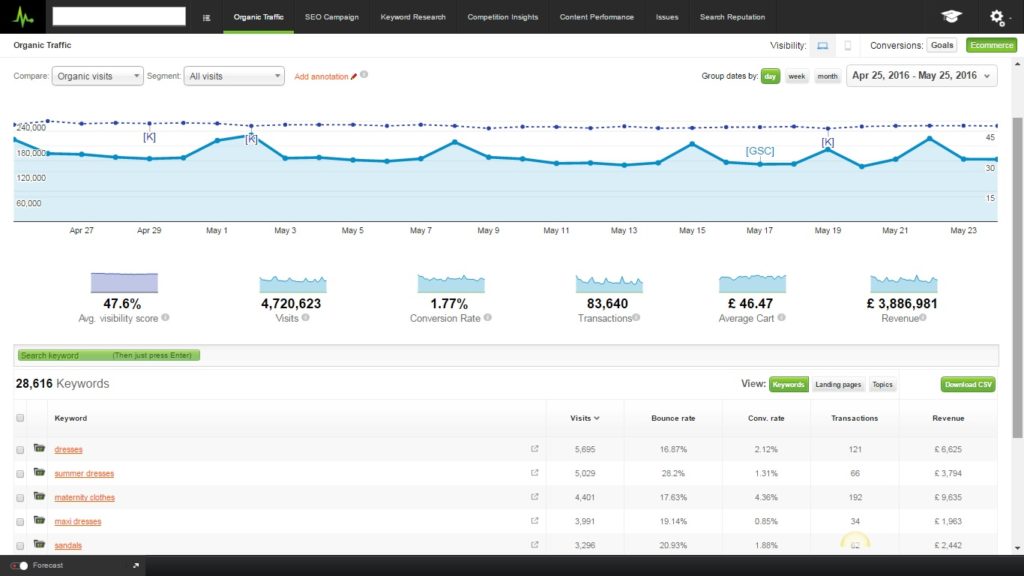How to Recover Google’s (Not Provided) Keyword Data
As long as people use words to communicate with search engines, keywords will have value, which is why Google’s decision to stop sharing keyword data can be frustrating. Whether you’re new to SEO and struggling with (not provided) for the first time, or you’re a seasoned pro who is accustomed to trying to work with other data—I have good news.
You can have your (not provided) keyword data back.

The Day the Data Died
On September 23, 2013, Google announced they would be using secure sockets layer (SSL) encrypted search for all users. It was the beginning of the (not-provided) keywords. Where marketers used to be able to see which keywords led traffic to their sites, we started to see “(not provided)” instead.
Keyword data was no longer available, and that had a major impact on SEO performance and strategy.
Some marketers turned to other metrics to drive their SEO strategies and justify their budgets, but most of those alternatives are insufficient. The only metrics that CMOs and business owners want to see are those that help them achieve their business goals. The total number of organic visits available in most analytics tools isn’t one of them.
Branded vs Non-Branded Traffic
Organic traffic splits into two major segments: branded and non-branded organic traffic.
- Branded organic traffic—Traffic to your site from queries that include your brand name. “Grasshopper phone systems” and “Jobvite software” are branded traffic terms. Branded traffic is a form of direct traffic, and speaks to the company’s overall popularity.
- Non-branded organic traffic—Traffic to your site that does not include your brand name, like “office phones” or “recruiting software.” This traffic is a result of the company’s visibility in search engines.
To measure, predict, and improve SEO performance, you have to access non-branded organic traffic. Why?
- It’s the most conclusive indicator of your SEO performance. While rankings are important, there are no insights regarding how visibility in search engines actually impacts your business. Plus, visibility is not a metric you can use to compare the performance of the SEO channel to other digital marketing channels. Once you start measuring the non-branded organic traffic, you can compare SEO against paid search advertising, social media, etc.
- It helps you put together an effective SEO strategy. If you’re looking to increase sales from your SEO activity, selecting the best-performing keywords is crucial. To do so, you need to rely on historical data, such as keywords that already bring in transactions and revenue. Without access to (not-provided) data, you can not prioritize such keywords and, therefore, you are missing on valuable opportunities.
- It helps you establish the ROI of any SEO activity. As long as you don’t know if the keywords in your SEO campaigns are bringing you visits and conversions, it’s impossible to measure SEO performance and, implicitly, justify the budget you invest.
Unfortunately, this branded vs non-branded segmentation is no longer available in Google Analytics.
As a consequence, marketers have started to rely more on other metrics (some of them misleading), like keyword ranking or the total number of organic visits. Ranking and the website’s overall visibility in search engines are indicators of a campaign’s progress, but don’t help marketers understand how SEO performance actually impacts the bottom line.
Unlock the (Not Provided) and Get Non-branded Data Back
The most reliable solution for reclaiming this data is to merge Google Analytics and Google Search Console data:
- Use Google Search Console to view (almost) the entire list of keywords that brought clicks to your website and the landing page they triggered.
- Use Google Analytics to view your organic traffic, segmented by landing pages.
- Connect the keywords data (clicks in Google Search Console) with the sessions, revenue, and conversions (Google Analytics), using the landing pages as common threads.
- Divide the total number of session per landing page proportionally to the number of clicks each keyword triggered. Do that as well for the total number of conversions and revenue to get a full picture of what impact each keyword had.
The API available for both tools enables you to extract the data. The next step is to combine the information through a simple automation. You can do this in-house, with the help of a programmer, or you can use SEOmonitor.
Our tool automatically discloses the (not-provided) data on a daily basis, giving you all the information you need about the keywords that brought traffic and conversions.

There are other suggested methods out there, but none of them is as accurate and reliable as combining the data from these two Google tools.
Reunited with (Not Provided) Keywords
Imagine the kind of SEO results you could drive with your keyword data restored. Imagine not having to guess which terms are driving traffic to your site, or which phrases are leading to higher conversions. Imagine having real, substantial data to bring to the C-suite and to improve your SEO strategy.
Set up your Search Console and Analytics and give it a try. If it’s helpful, you can explore how to best continue developing that reporting. If it’s not … well, how could it not be helpful?
Cosmin Negrescu (@ncosmin) is the Founder and CEO of SEOmonitor, and a prolific speaker. He lives in Bucharest, Romania, with his wife, and was recently featured as one of Fortune Romania’s 30 Under 30 for 2016.
What's Next?
Profound Strategy is on a mission to help growth-minded marketers turn SEO back into a source of predictable, reliable, scalable business results.
Start winning in organic search and turn SEO into your most efficient marketing channel. Subscribe to updates and join the 6,000+ marketing executives and founders that are changing the way they do SEO:
And dig deeper with some of our best content, such as The CMO’s Guide to Modern SEO, Technical SEO: A Decision Maker’s Guide, and A Modern Framework for SEO Work that Matters.



